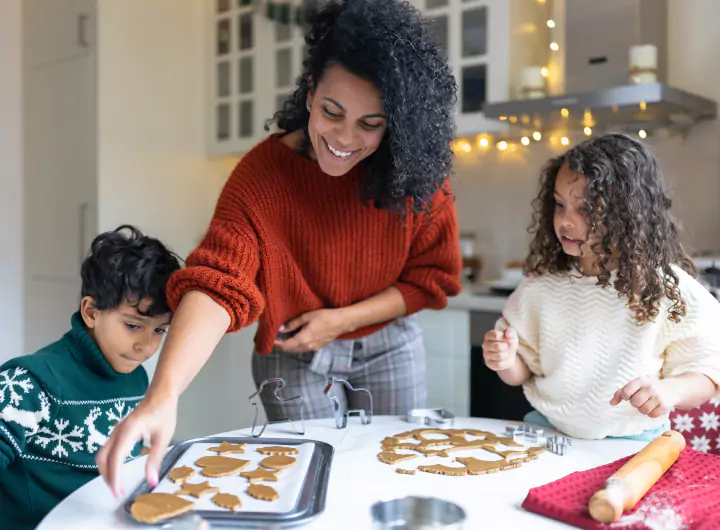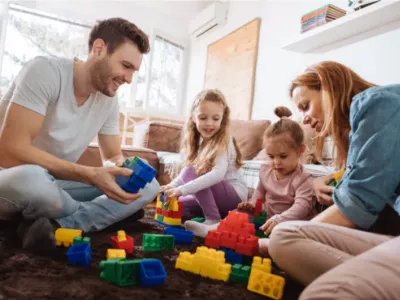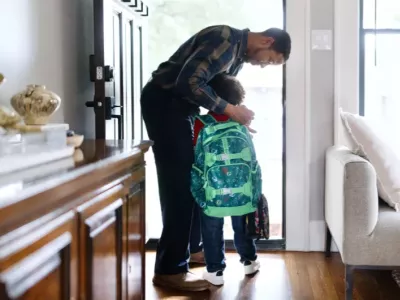Consider presence over presents: promoting gratitude with our kids

It's that time of year again. The stores are full of glittering gifts at eye-level height, perfect for young children to see and reach for. You might have just popped out to the grocery store or be shopping for another family member, but if your kids are in tow, it's easy for everyone to become overwhelmed by the merry things on offer and want, want, want. For parents and carers of younger kids, you might even find yourself standing in the store while your child is begging for toys they must have. They could be whining: "I want it right now, I really need it pleeeaasse?!"
In that moment, you may be worried about being judged by other shoppers for spoiling your child or for leaving them to cry on the store floor. You could also be stressed about whether your Christmas budget means you can even afford to buy it, as the cost-of-living crisis is still hitting families hard. You might even be wishing for Santa's help about how to stop the whining and get your kids to be more grateful.
So, this festive season, how can we inspire our children to be grateful for what they get and to ask nicely for what they want, instead of whining at you?
How to inspire gratitude in kids
Something to consider this year is putting more focus on presence over presents. The gift of quality time together can be a present in itself, as corny as that may sound. We play an important role in shaping our children's values1 and it is often the memories of festive times and traditions with loved ones that our children truly cherish, not just the thoughts of any gifts they received. That's not to say that you shouldn't buy your kids presents, but encouraging gratitude in our children can have a positive impact on their overall wellbeing and their relationships.1
Practise family gratitude together
Part of being together and spending quality time with your children can involve helping them learn to be grateful. Depending on their age, you could try things like:
- Sharing gratitude: At the end of the day, ask each other: "What made you happy today?" If children are old enough, writing a short list of what they are grateful for can positively impact their wellbeing.2
- Showing self-compassion: children who are kind to themselves have a better appreciation of the world around them.3 You can help by sharing what you are grateful for about them or just by giving them a nice compliment like: "Thanks for helping me clean up, I am so grateful for how helpful you are."
- Being in the moment: Take time to pause and enjoy the festive season together, like decorating the house, listening to music, or going to look at the holiday lights. This type of mindful behaviour can help with thankfulness, and, for teens, research shows it is even linked to a better quality of life.4
Role model different ways of showing gratitude
When you are spending time together as a family, consider that as parents and carers we play a key role in children learning to show and understand gratitude.1 Most children don't develop the ability to be 'grateful' until they are anywhere between 7-14 years old, but they can learn positive emotions from their parents and carers at any age.1 Part of teaching them these life skills is behaving the way you would like them to act. While you might want to joke about a present you have received ("Not socks again!"), consider the message this could send to your child. Instead, responding with gratitude, ("I always need socks, thank you!") shows children what being thankful looks like – and they are more likely to learn to be grateful themselves.
Teaching asking instead of whining to encourage gratitude
It's normal for children to want things. It's human nature. Whining is also common in young children, as frustrating as it is for us. Whining is that long, drawn-out way of speaking or nagging tone of voice that most parents or carers will have heard at some point, possibly if they have braved the mall with a younger child during the festive season. They might have whined for something they didn't get, or even whined about something they did get. You might be thinking to yourself: Why isn't my child being grateful? How can I prevent this whining happening in the first place, and how can I respond to it?
What to do before the whining starts
Teaching your children to ask nicely for what they want is key to reducing whining. This can happen at home by setting a good example through teaching them what you would like them to say. If they want something, you can show them how to ask for this by modelling a pleasant and calm voice, like: "Can I please have a chocolate bar?" In future, you can then remind them to use nice words to ask for things – and praise them when they do.
You can also help your child manage their impulse control by planning ahead and setting clear expectations, particularly for when you're somewhere like a grocery store or mall. If you are planning on going shopping with your child this season, set limits before you go, to help stop whining when you're there. These expectations can take many forms depending on what you do as a family. Some people let their children choose a certain number of Christmas presents, others ask them to take a photo of what they want and add it to a wish list, while some give their children a budget (when they are old enough). Creating boundaries that are right for your family can make you all feel more in control and prepared. Role modelling can work here too, like being thankful to the checkout cashier when you do buy something.
How to support behaviour you like
When your child is still learning to be grateful and is whining, or a full-blown shopping tantrum happens, it can help to try to stay calm and respond rather than react. This is keeping in mind that children may not be able to manage their emotions as well as adults. Young children may need more support around learning that their demands cannot always be met, and all children have a desire to feel they are heard. If they whine, try stopping what you are doing and bending down to their eye-level, while calmy giving them a direction to stop whining and ask nicely. If they keep whining, you may want to consider not paying as much attention to them until the whining stops. When it stops, remind them to ask nicely and thank them when they do this.
When they do ask nicely: is it a reasonable request?
Another thing to consider is if what your child wants is actually reasonable and they have asked you the way you want them to. It might not necessarily be something they need , yet it could bring them joy. The key is in how they have asked for it and this could be a great opportunity to encourage the behaviour you like. Be it a new T-shirt or a lollipop, if they have asked you nicely and the circumstances are right, there may be no harm in giving your child what they want. It can help to also praise them for asking nicely if they do this. This way, you are helping them learn that when they positively demonstrate what you have taught them, you will encourage and thank them.
Shopping this season
Some responses that might be helpful if your child won't take no for an answer:
If you can't buy it right now:
"We can't buy it today, let's take a photo for later or write it on your wish list."
If it's too expensive or unsuitable for them, try suggesting other options:
"I can see why you would love to have this, but we can only buy so much. Here are some other things you can choose from that you might like."
If it's out of their budget (for older kids):
"Remember you have a certain amount to spend, is this in your budget? I can help you think of some other options that might fit."
If you are shopping for someone else:
"I know you want things too, please help me pick out this gift today and we can focus on what you want another day."
Overall, the holiday season can be a joyful, yet stressful time for families. It is a busy time of year and can be hard for many parents, carers and their children to manage their feelings. You are not alone! By trying to stay calm and with some simple strategies at hand, you could turn these challenging moments into an opportunity for your child to learn. Grateful parents and carers tend to raise grateful children.5 By promoting the idea of gratitude, teaching asking instead of whining, and spending quality time together, your family could have a magical festive season to cherish for years to come.
Access proven strategies to help build your skills and manage challenging behaviour this festive season with Triple P Online or Teen Triple P Online.
References
- Obeldobel, C. A., & Kerns, K. A. (2021). A literature review of gratitude, parent-child relationships, and well-being in children. Developmental Review, 61, 100948. https://doi.org/10.1016/j.dr.2021.100948
- Hall, A.H., Bache-Wiig, G. & White, K.M. (2024). Exploring the impact of gratitude practice as a protective factor for young children. Early Childhood Education Journal, 1-9. https://doi.org/10.1007/s10643-023-01623-3
- Yang, Y., Kong, X., Guo, Z., & Kou, Y. (2021). Can self-compassion promote gratitude and prosocial behavior in adolescents? A 3-year longitudinal study from China. Mindfulness, 12, 1377-1386. https://doi.org/10.1007/s12671-021-01605-9
- Anand, P., Bakhshi, A., Gupta, R., & Bali, M. (2021). Gratitude and quality of life among adolescents: The mediating role of mindfulness. Trends in Psychology, 29(4), 706-718. https://doi.org/10.1007/s43076-021-00077-z
- Rothenberg, W. A., Hussong, A. M., Langley, H. A., Egerton, G. A., Halberstadt, A. G., Coffman, J. L., Mokrova, I., & Costanzo, P. R. (2016). Grateful parents raising grateful children: Niche selection and the socialization of child gratitude. Applied Developmental Science, 21(2), 106-120. https://doi.org/10.1080/10888691.2016.1175945

